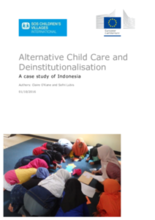This report is a case study of alternative child care in Indonesia. The fieldwork for this report took place between 5 September and 14 September 2016. Seventy-three people were consulted through 21 interviews. In 2006, Research was conducted that found that with an estimate of 8,000 institutional facilities servicing 500,000 children, Indonesia was overly reliant on institutional care. Poverty and hope for a better education are the primary reasons children are placed in care.
Citing research from MoSA and Save the Children, this report identifies the following key areas of change for child care reform: 1) Evidence based advocacy, 2) Policy and legal reform, 3) Capacity building and engagement of key duty bearers and stakeholders in change process, 4) Initiating a shift in human and financial resource to support transformation towards family and child centered services, and 5) Establish good models of interventions that are child and family centered and support family based care.

